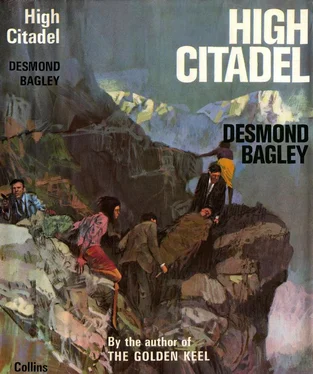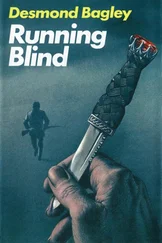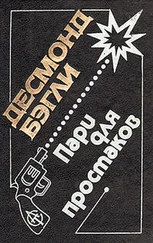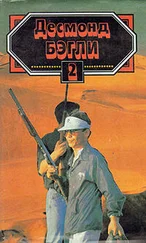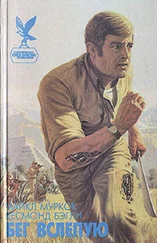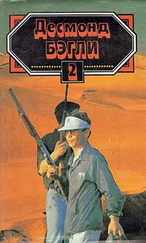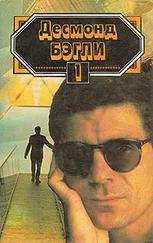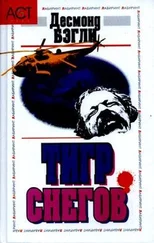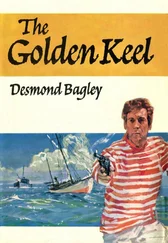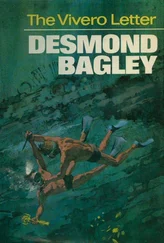The Russian — if such he was — conferred with the Cuban and an argument seemed to develop, the Cuban waving his arms violently and the Russian stolidly stonewalling with his hands thrust deep into his coat pockets. He won the argument for the Cuban suddenly turned away and issued a string of rapid orders and the hillside on the other side of the gorge became a sudden ants’ nest of activity.
The idling men disappeared behind the rocks again and it was as though the mountain had swallowed them. With frantic speed four men finished stripping the canvas from the second truck and the Cuban shouted to the Russian and waved his arms. The Russian, after one long look over the gorge, nonchalantly turned his back and strolled towards his car.
‘By God, they’re going to break the truce,’ said O’Hara tightly. He grabbed the loaded crossbow as the machine-gun suddenly ripped out and stitched the air with bullets. ‘Get back to the trebuchet.’ He aimed the bow carefully at the Russian’s back, squeezed the trigger and was mortified to miss. He ducked to reload and heard the crash of the trebuchet behind him as Willis pulled the firing lever.
When he raised his head again he found that the trebuchet shot had missed and he paled as he saw what had been pulled out of the truck. It was a prefabricated length of bridging carried by six men who had already set foot on the bridge itself. Following them was a squad of men running at full speed. There was nothing that a single crossbow bolt could do to stop them and there was no time to reload the trebuchet — they would be across the bridge in a matter of seconds.
He yelled at Willis and Armstrong. ‘Retreat! Get back up the road — to the camp!’ and ran towards the bridgehead, bow at the ready.
The first man was already across, scuttling from side to side, a sub-machine-gun at the ready. O’Hara crouched behind a rock and took aim, waiting until the man came closer. The mist was thickening rapidly and it was difficult to judge distances, so he waited until he thought the man was twenty yards away before he pulled the trigger.
The bolt took the man full in the chest, driving home right to the fletching. He shouted in a bubbling voice and threw his hands up as he collapsed, and the tightening death grip on the gun pulled the trigger. O’Hara saw the rest of the squad coming up behind him and the last thing he saw before he turned and ran was the prone figure on the ground quivering as the sub-machine-gun fired its magazine at random.
Rohde hacked vigorously at the ice wall with the small axe. He had retrieved it — a grisly job — and now it was coming in very useful, returning to its designed function as an instrument for survival. Forester was lying, a huddled heap of old clothing, next to the ice wall, well away from the edge of the cliff. Rohde had stripped the outer clothing from Peabody’s corpse and used it to wrap up Forester as warmly as possible before he pushed the body into the oblivion of the gathering mists below.
They needed warmth because it was going to be a bad night. The ledge was now enveloped in mist and it had started to snow in brief flurries. A shelter was imperative. Rohde stopped for a moment to bend over Forester who was still conscious, and adjusted the hood which had fallen away from his face. Then he resumed his chopping at the ice wall.
Forester had never felt so cold in his life. His hands and feet were numb and his teeth chattered uncontrollably. He was so cold that he welcomed the waves of pain which rose from his chest; they seemed to warm him and they prevented him from slipping into unconsciousness. He knew he must not let that happen because Rohde had warned him about it, slapping his face to drive the point home.
It had been a damned near thing, he thought. Another couple of slashes from Peabody’s knife and the rope would have parted to send him plunging to his death on the snow slopes far below. Rohde had been quick enough to kill Peabody when the need for it arose, even though he had been squeamish earlier. Or perhaps it wasn’t that; perhaps he believed in expending just the necessary energy and effort that the job required. Forester, watching Rohde’s easy strokes and the flakes of ice falling one by one, suddenly chuckled — a time-and-motion-study killer; that was one for the books. His weak chuckle died away as another wave of pain hit him; he clenched his teeth and waited for it to leave.
When Rohde had killed Peabody he had waited rigidly for a long time, holding the rope taut for fear that Peabody’s body would slide over the edge, taking Forester with it. Then he began to dig the ice-axe deeper into the snow, hoping to use it to belay the rope; but he encountered ice beneath the thin layer of snow and, using only one hand, he could not force the axe down.
He changed his tactics. He pulled up the axe and, frightened of being pulled forward on the slippery ice, first chipped two deep steps into which he could put his feet. That gave him the leverage to haul himself upright by the rope and he felt Peabody’s body shift under the strain. He stopped because he did not know how far Peabody had succeeded in damaging the rope and he was afraid it might part and let Forester go.
He took the axe and began to chip at the ice, making a large circular groove about two feet in diameter. He found it a difficult task because the head of the axe, improvised by Willis, was set at an awkward angle on the shaft and it was not easy to use. After nearly an hour of chipping he deepened the groove enough to take the rope, and carefully unfastening it from round his waist he belayed it round the ice mushroom he had created.
That left him free to walk to the edge of the cliff. He did not go forward immediately but stood for a while, stamping his feet and flexing his muscles to get the blood going again. He had been lying in a very cramped position. When he looked over the edge he saw that Forester was unconscious, dangling limply on the end of the rope, his head lolling.
The rope was badly frayed where Peabody had attacked it, so Rohde took a short length from round his waist and carefully knotted it above and below the potential break. That done, he began to haul up the sagging and heavy body of Forester. It was hopeless to think of going farther that day. Forester was in no condition to move; the fall had tightened the rope cruelly about his chest and Rohde, probing carefully, thought that some ribs were cracked, if not broken. So he rolled Forester up in warm clothing and relaxed on the ledge between the rock cliff and the ice wall, wondering what to do next.
It was a bad place to spend a night — even a good night — and this was going to be a bad one. He was afraid that if the wind rose to the battering strength that it did during a blizzard, then the overhanging cornice on the ice wall would topple — and if it did they would be buried without benefit of gravediggers. Again, they must have shelter from the wind and the snow, so he took the small axe, wiped the blood and the viscous grey matter from the blade, and began to chip a shallow cave in the ice wall.
The wind rose just after nightfall and Rohde was still working. As the first fierce gusts came he stopped and looked around wearily; he had been working for nearly three hours, chipping away at the hard ice with a blunt and inadequate instrument more suited to chopping household firewood. The small cleft he had made in the ice would barely hold the two of them but it would have to do.
He dragged Forester into the ice cave and propped him up against the rear wall, then he went out and brought in the three packs, arranging them at the front of the cave to form a low and totally inadequate wall which, however, served as some sort of bulwark against the drifting snow. He fumbled in his pocket and turned to Forester. ‘Here,’ he said urgently. ‘Chew these.’
Читать дальше
Конец ознакомительного отрывка
Купить книгу
